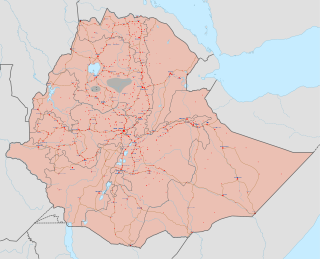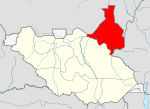
The Ogaden National Liberation Front is a grass roots social and political movement, which was founded in 1984, in order to campaign for the right to self-determination for Somalis in the Somali Region of Ethiopia.

This article covers the period of the history of Sudan between 1985 and 2019 when the National Islamic Front (NIF) seized power in the 1985 Sudanese coup d'état establishing an Islamic government in Sudan. Not long after, Field Marshal Omar al-Bashir took power in the 1989 coup where he ruled as President until his fall in April 2019. During Bashir's rule, also referred to as Bashirist Sudan, he was re-elected three times while overseeing the independence of South Sudan in 2011. His regime was criticized for human rights abuses, atrocities and genocide in Darfur and allegations of harboring and supporting terrorist groups in the region while being subjected to United Nations sanctions beginning in 1995, resulting in Sudan's isolation as an international pariah.

The War in Darfur, also nicknamed the Land Cruiser War, is a major armed conflict in the Darfur region of Sudan that began in February 2003 when the Sudan Liberation Movement (SLM) and the Justice and Equality Movement (JEM) rebel groups began fighting against the government of Sudan, which they accused of oppressing Darfur's non-Arab population. The government responded to attacks by carrying out a campaign of ethnic cleansing against Darfur's non-Arabs. This resulted in the death of hundreds of thousands of civilians and the indictment of Sudan's president, Omar al-Bashir, for genocide, war crimes, and crimes against humanity by the International Criminal Court.

The Somalia War, also known as the Ethiopian occupation of Somalia or Ethiopian intervention in Somali Civil War was an armed conflict involving largely Ethiopian and Somali Transitional Federal Government (TFG) forces and Somali troops from Puntland versus the Somali Islamist umbrella group, the Islamic Court Union (ICU), and other affiliated militias for control of Somalia.

The 2007–2008 Ethiopian crackdown in Ogaden was a military campaign by the Ethiopian Army against the Ogaden National Liberation Front (ONLF). The crackdown against the guerrillas began after they killed 74 people in an attack on a Chinese-run oil exploration field in April 2007.

The Abyei Area is an area of 10,546 km2 or 4,072 sq mi on the border between South Sudan and the Sudan that has been accorded "special administrative status" by the 2004 Protocol on the Resolution of the Abyei Conflict in the Comprehensive Peace Agreement (CPA) that ended the Second Sudanese Civil War. The capital of the Abyei Area is Abyei Town. Under the terms of the Abyei Protocol, the Abyei Area was considered, on an interim basis, to be simultaneously part of both the Republic of South Sudan and the Republic of the Sudan, effectively a condominium.

The Insurgency in Ogaden was an armed conflict that took place from 1994 to 2018. It was fought by separatists, the Ogaden National Liberation Front (ONLF), against the Ethiopian government. The war began in 1994, when the ONLF tried to separate Ethiopia's Somali Region from Ethiopia. It ended in a peace agreement as part of Prime Minister Abiy Ahmed's reforms.

The Sudanese conflict in South Kordofan and Blue Nile is an armed conflict in the Sudanese southern states of South Kordofan and Blue Nile between the Sudanese Army (SAF) and Sudan People's Liberation Movement-North (SPLM-N), a northern affiliate of the Sudan People's Liberation Movement (SPLM) in South Sudan. After some years of relative calm following the 2005 agreement which ended the second Sudanese civil war between the Sudanese government and SPLM rebels, fighting broke out again in the lead-up to South Sudan independence on 9 July 2011, starting in South Kordofan on 5 June and spreading to the neighboring Blue Nile state in September. SPLM-N, splitting from newly independent SPLM, took up arms against the inclusion of the two southern states in Sudan with no popular consultation and against the lack of democratic elections. The conflict is intertwined with the War in Darfur, since in November 2011 SPLM-N established a loose alliance with Darfuri rebels, called Sudan Revolutionary Front (SRF).

Taban Deng Gai is a South Sudanese politician who has been one of the Vice Presidents of South Sudan in the unity government since February 2020. He served as the First Vice President of South Sudan from 23 July 2016 to February 2020. He was mining minister before being appointed as acting first vice president.
Ethnic violence in South Sudan has a long history among South Sudan's varied ethnic groups. South Sudan has 64 tribes with the largest being the Dinkas, who constitute about 35% of the population and predominate in government. The second largest are the Nuers. Conflict is often aggravated among nomadic groups over the issue of cattle and grazing land and is part of the wider Sudanese nomadic conflicts.

The United Nations Mission in South Sudan (UNMISS) is a United Nations peacekeeping mission for South Sudan, which became independent on 9 July 2011. UNMISS was established on 8 July 2011 by United Nations Security Council Resolution 1996 (2011).

The South Sudanese Civil War was a multi-sided civil war in South Sudan between forces of the government and opposition forces. In December 2013, President Kiir accused his former deputy Riek Machar and ten others of attempting a coup d'état. Machar denied trying to start a coup and fled to lead the SPLM – in opposition (SPLM-IO). Fighting broke out between the Sudan People's Liberation Movement (SPLM) and SPLM-IO, igniting the civil war. Ugandan troops were deployed to fight alongside the South Sudanese government. The United Nations has peacekeepers in the country as part of the United Nations Mission in South Sudan (UNMISS).

The Sudan People's Liberation Movement-in-Opposition, also known as the anti-governmental forces (AGF), is a mainly South Sudanese political party and rebel group that split from the Sudan People's Liberation Movement in 2013, due to political tensions between President Salva Kiir and Vice President Riek Machar over leadership of the SPLM. Tensions grew between forces loyal to Kiir and Machar and South Sudan plunged into the South Sudanese Civil War.

Armed clashes took in Wau State from late June 2016 to January 2019 between the Dinka-dominated Sudan People's Liberation Army (SPLA) and local opposition forces, consisting of tribal Fertit militias as well as fighters claiming allegiance to Riek Machar. It is unclear to what extent these rebels were actually part of the SPLM-IO or acting independently while using the SPLM-IO's name. The clashes resulted in the arrest of the state's governor, Elias Waya Nyipuoc, widespread death and destruction in the state capital, Wau town, and the displacement of up to 150,000 people.

The Pagak offensive was a major military operation by the South Sudanese government during the South Sudanese Civil War with the aim of capturing the strategic town of Pagak and the wider Maiwut County from Riek Machar's SPLM-IO rebels. Since the civil war's beginning, Pagak had served as headquarters and stronghold for the rebels, and its loss was believed to possibly greatly weaken the insurgency. A large part of the government forces that took part in the offensive are members of the SPLM-IO, a break-away group from Machar's movement that is loyal to First Vice President Taban Deng Gai. Though pro-government forces managed to capture Pagak on 6 August, their attempts to secure the surrounding areas proved unsuccessful. As result, the SPLA-held corridor between Mathiang and Pagak remained unsafe.

The Ethiopian Unity Patriots Front is a political party and militant rebel organization that waged an insurgency against the Ethiopian government from 1993 to 2012. Formed by ex-officials of the Derg regime, the EUPF was mostly active in Ethiopia's Gambela Region as well as eastern Sudan and South Sudan. The group agreed to a ceasefire with the Ethiopian government in 2012, and officially ended its insurgency in 2016. The EUPF remains active, however, and its armed wing has reportedly been involved in the South Sudanese Civil War, although to what extent is disputed.
Events in the year 2020 in Sudan.

The Tigray War is an ongoing civil war that began on 3 November 2020 in the Tigray Region of Ethiopia. The local Tigray Defense Forces (TDF) are fighting the Ethiopian National Defense Force (ENDF), the Ethiopian Federal Police, regional police, and gendarmerie forces of the neighbouring Amhara and Afar regions with the involvement of the Eritrean Defence Forces (EDF). All sides, particularly the ENDF, EDF, and TDF have committed war crimes during the conflict. Due to the onset of the war, a deep humanitarian crisis has developed. On 24 March 2022, the Ethiopian government declared an indefinite humanitarian truce, in order to allow the delivery of humanitarian aid into Tigray. On 25 April, 2022, the spokesperson for TPLF, Getachew Reda, told Reuters that they have completely withdrawn their troops from neighboring Afar region, in hopes of humanitarian aid entering Tigray Region.
This Timeline of the Tigray War is part of a chronology of the military engagements of the Tigray War, a civil war that began in the Tigray Region of Ethiopia in early November 2020.
















